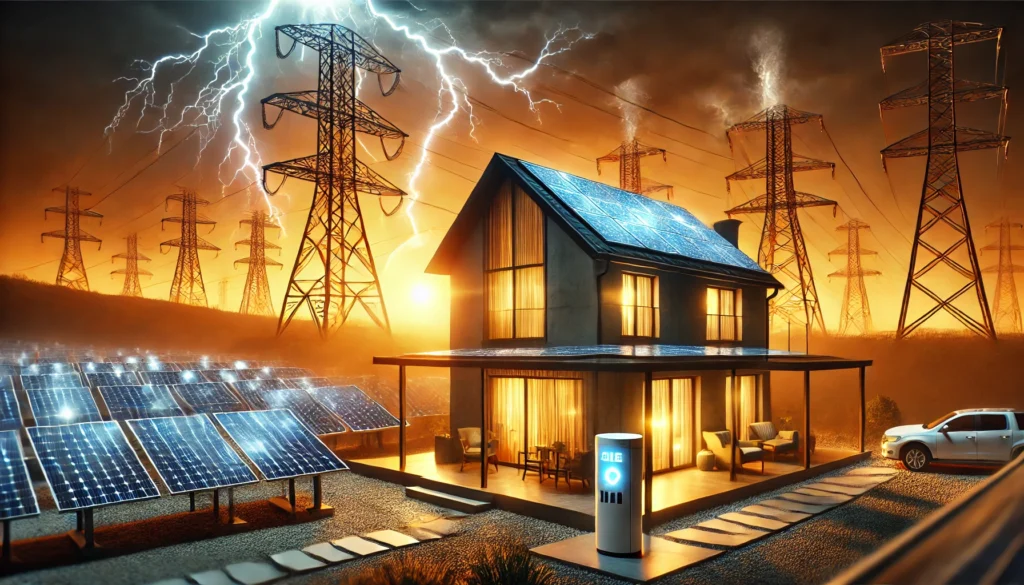Solar Demand Surges as Grid Reliability Concerns Grow: Why More U.S. Homeowners Are Choosing Energy Independence in 2025
As the U.S. grapples with escalating electricity demand and increasing grid instability, a growing number of homeowners are turning to solar energy and battery storage systems to secure their energy future. In 2025, the convergence of extreme weather events, aging infrastructure, and rising utility rates has underscored the urgency for energy independence.
The Growing Strain on the U.S. Power Grid
Recent reports highlight a significant uptick in electricity demand, driven by factors such as the proliferation of data centers, electrification of transportation, and increased residential energy use. A study by ICF projects a 25% increase in U.S. electricity demand by 2030 and a staggering 78% by 2050 compared to 2023 levels. This surge places immense pressure on an already strained grid, particularly in regions like Texas and the Midwest, where infrastructure may not be equipped to handle the load during extreme weather conditions. utilitydive.com+2Axios+2Axios+2The Washington Post
The North American Electric Reliability Corporation (NERC) warns that a significant portion of the U.S. is at heightened risk for power outages this summer due to rising electricity demand and the challenges posed by extreme weather. The combination of increased demand and the retirement of aging power plants exacerbates the risk of blackouts, especially during peak usage times.utilitydive.com+3The Washington Post+3Reuters+3
Rising Electricity Costs Compound the Issue
As demand outpaces supply, electricity prices are on the rise. The U.S. Energy Information Administration (EIA) projects that residential electricity prices will average 16.7 cents per kilowatt-hour in 2025, up from 15 cents in 2022. Factors contributing to this increase include higher natural gas prices, infrastructure upgrades, and the costs associated with integrating renewable energy sources.utilitydive.com
For homeowners, this translates to higher monthly utility bills and greater vulnerability to price volatility. The financial strain is particularly acute in regions prone to extreme weather, where power outages can lead to additional expenses related to emergency preparedness and property damage.
Solar and Battery Storage: A Path to Energy Independence
In response to these challenges, many homeowners are investing in solar panels coupled with battery storage systems. This combination offers a reliable and sustainable solution to grid instability and rising energy costs.Carbon Credits
Key Benefits:
- Resilience During Outages: Battery storage systems provide backup power during grid failures, ensuring that essential appliances and systems remain operational.
- Cost Savings: By generating their own electricity, homeowners can reduce or eliminate their reliance on the grid, leading to significant savings on utility bills.MF Solar
- Environmental Impact: Solar energy is a clean, renewable resource that reduces greenhouse gas emissions and reliance on fossil fuels.
In Texas, for example, the expansion of solar and battery storage has played a crucial role in maintaining grid stability during extreme heat events. During a record-breaking early heat wave in May 2025, solar energy contributed up to 40% of the grid’s daytime power, with enhanced battery capacity providing stability during critical evening hours. houstonchronicle.comSan Antonio Express-News
Incentives Make Solar More Accessible
Federal and state incentives have made the adoption of solar energy more financially feasible for homeowners. The Inflation Reduction Act offers a 30% tax credit for residential solar installations, and additional incentives are available for systems that utilize domestically produced components.
These incentives, combined with the long-term savings on energy bills, make solar and battery storage systems a wise investment for homeowners seeking energy independence and financial stability.
Conclusion: Taking Control of Your Energy Future
As grid reliability concerns grow and electricity costs continue to rise, investing in solar energy and battery storage offers homeowners a proactive solution to ensure energy security and financial resilience. By generating and storing their own power, homeowners can mitigate the risks associated with grid instability and take control of their energy future.
If you’re considering making the switch to solar, now is the time to act. Contact us today to learn more about how solar energy can benefit your home and help you achieve energy independence in 2025 and beyond.
Ready to make the switch?
Contact us today to learn how solar panels can help you save more in the long run!
Complete Residential Solar Panels and Systems. Serving Texas, Oklahoma, Kansas, Missouri, Utah, Florida & Ohio
Get a Free Quote Now
